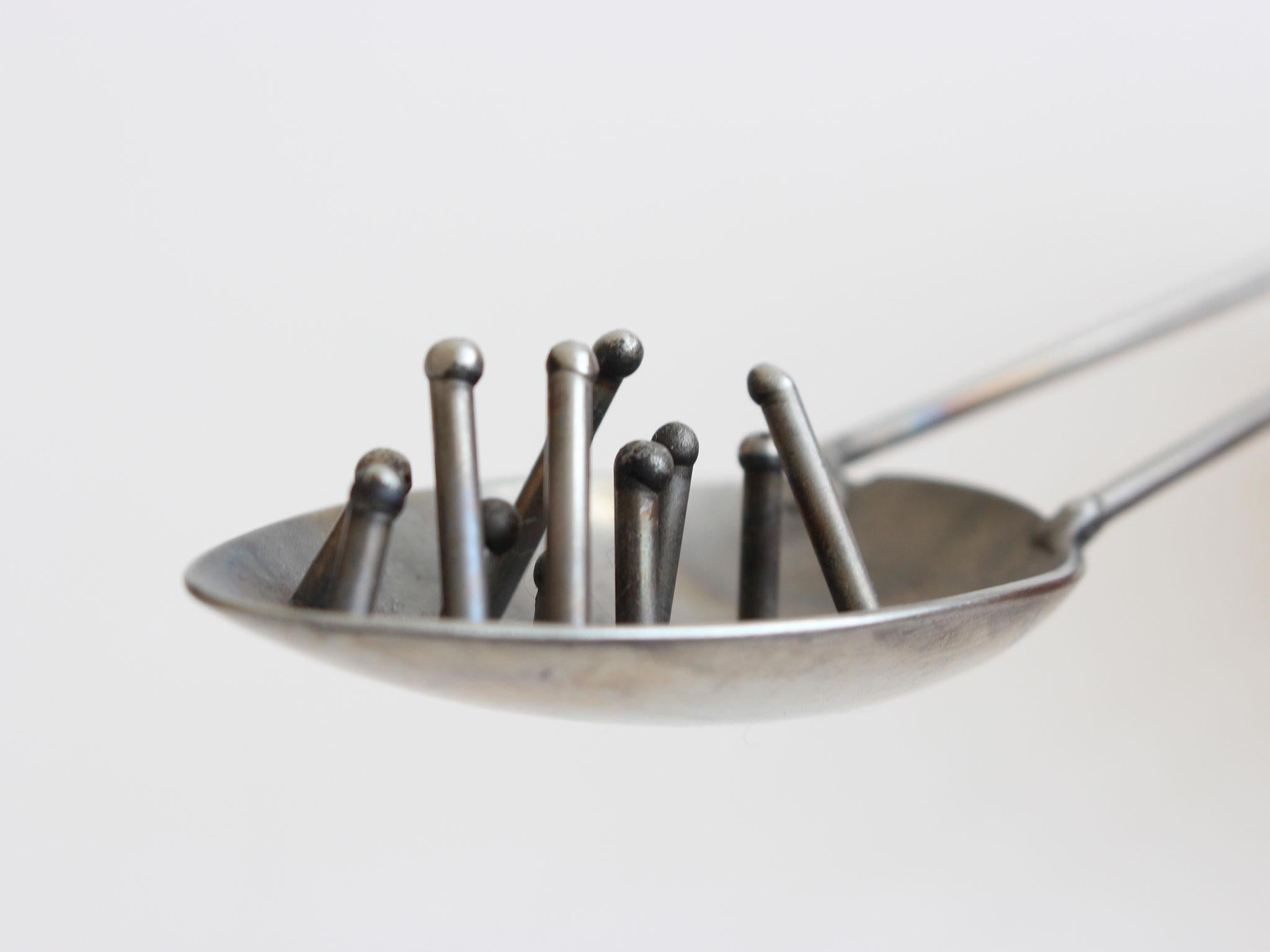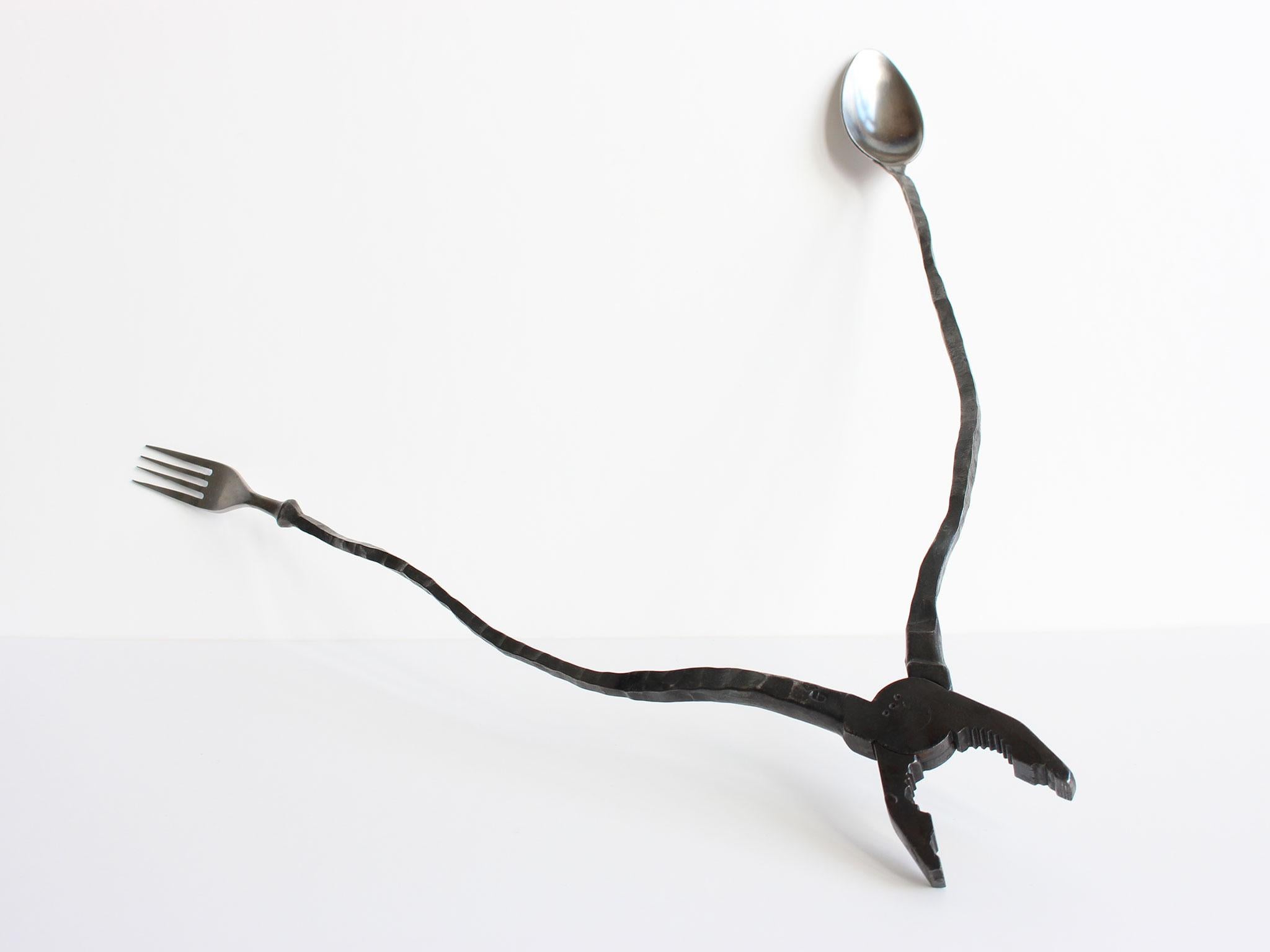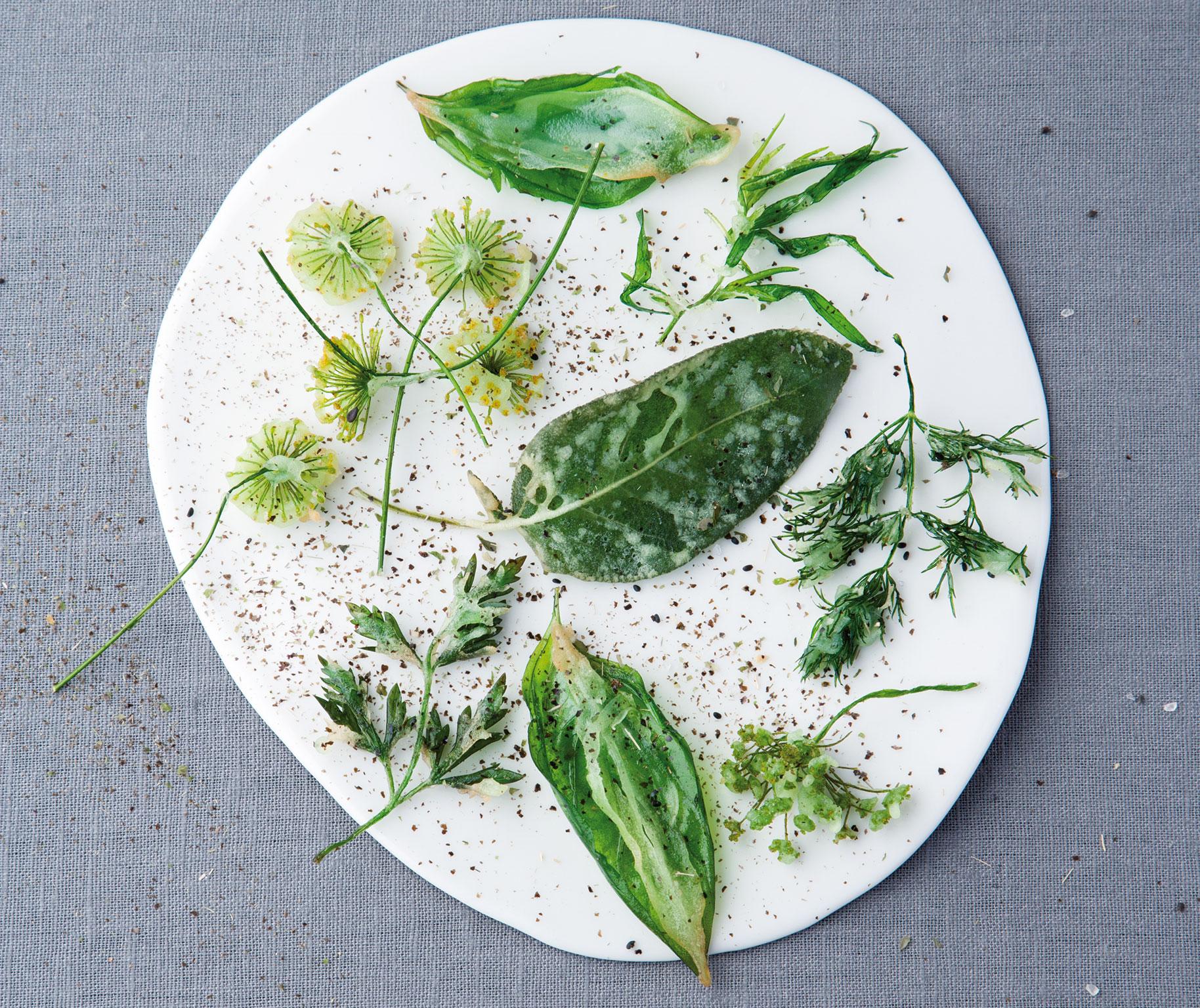The supper club where diners are given spoons filled with nails to promote slow, mindful eating
Steinbeisser has asked artists from 35 different countries to create tableware that challenges eating norms using locally sourced materials

What did you have for dinner last night? I had a lobster bisque, which I lovingly assembled despite working hard all week. Kidding! I had cheese on toast and the remaining unwilted salad leaves from the packet stuck to the back of the fridge, because I couldn’t be bothered to go the supermarket and it was fast. Very fast.
This is the kind of meal that would make the Steinbeisser supper club in Amsterdam reach for the smelling salts. They want to slow dining down – hence their name meaning "biting a stone" – and challenge how every aspect of dining is approached.
For their annual Experimental Gastronomy autumn events, Steinbeisser has commissioned artists from 35 different countries, from Japan to Estonia, to create the antithesis to “efficient and functional” tableware using locally sourced or recycled materials. The results include a spoon with nail-heads jutting out of it; a claw-like fork as if from a dark fairy tale, and a gold-tipped dessert spoon attached to a spanner, as studies show the regal colour boosts the sweetness of dishes. The food served at events in Amsterdam, Switzerland and Saratoga, California, is vegan, organic and locally sourced, “because there is already an abundance of luscious dishes made with meat, fish, eggs and cheese”, says Martin Kullik of the Lloyd Hotel and Cultural Embassy where Steinbeisser is based. Diners who struggle to navigate their immaculately-arranged plates with bizarre utensils, unsurprisingly, eat slower and more attentively says Kullik. The entire process is a culinary challenge, for designs, chefs and diner, and cost between £107 to £530.
Admittedly, the utensils will likely be rather irritating by the last order. But considering that the average person spends three and a half years of their life eating a total of 35 tonnes of food, Steinbeisser’s deconstruction of eating makes an important point about food. Their events make spending 15 seconds choosing your dinner in the ready meal aisle and only slightly longer to inhale it lest you actually taste the congealed sludge, seem an equally absurd way to feed yourself. Their approach teases out debates over how many miles the food has travelled, to animal welfare and the global obesity epidemic. It even questions what ‘food’ actually is.
Approaching this idea at its most literal level, eating slower is proven to have physiological benefits. The theories of Victorian food thinker Horace Fletcher, who advised people to chew their food 100 times have been debunked, but consuming food slowly – or at least not wolfing it down by barely moving your jaw – improves digestion, helps with satiety, weight loss management and the release of hormones in the gut.
“Mindful eating is a positive experience of being more aware of what you are eating, why you are eating it, what part it plays in your day and lifestyle and what decisions have brought you to eat,” explains Sian Porter dietician and British Dietetic Association spokesperson. “Before a meal, think about what you are going to eat, how the meal will be calm and how you will enjoy your food without any problems,” she says, advising that 20 minutes should be set aside to sit up straight at a table and chew food properly. When you are finished, take five minutes to relax and let your food digest.
However, as anyone who has stared longingly at a glistening chocolate fudge cake will know, food isn’t only fuel but pleasure, too. Dinners at the Experimental Gastronomy event will also enjoy the conviviality of the occasion, particularly when they are each presented with a fork resembling a long comb. Eating has brought people together since time immemorial, says Roberta Sonnino, an expert in food at Cardiff University School of Geography. But now, the gap between food producers and consumers has widened and the global food industry is geared towards a quick high turnover of cheap food to be bought in uniform supermarkets. Industrialisation and now post-industrial habits – such as eating a packet of Monster Munch for lunch hunched at your desk – have eroded quality, cooking skills and social dining.
Mindful eating is a positive experience of being more aware of what you are eating, why you are eating it, what part it plays in your day and lifestyle and what decisions have brought you to eat.
“A “slow” meal is often a carefully prepared meal, which involves the use of good quality ingredients and cooking skills – two elements that have been seriously threatened by the industrialisation of the food system and, more generally, by a ‘modern’ way of life that has very much compressed the time at our disposal for cooking and eating,” says Professor Sonnino.
The UK in particular needs help in this respect, as the time that Britons have spent dining has declined for decades, while the infrastructure for food has become based around processed and tinned products – as highlighted by Jamie Oliver and his school dinners campaign a decade ago.

The Slow Food Movement has been devoted to turning the tide against fast food in every sense since it was founded in Italy three decades ago. Its members aim to preserve and celebrate regional traditions, high-quality food and the pleasures of luxuriating over a meal.
“Many people don't really think about what they are eating, by buying food which is largely pre-prepared, which has little taste or texture, and which at very best only tastes ‘OK’. Food should taste good, not OK,” says Shane Holland, the Executive Chairman of Slow Food in the UK. “More widely, it should sustain our landscape, employment, and support our traditions.” The Lake District, for instance, looks as it does because of the presence of Herdwick sheep.
“Our food choices affect more than just our own direct health and well-being,” says Holland, suggesting that ‘slow’ eating transcends the dinner table but the process of agriculture and cooking, too.
Holland also dismisses the idea that high-quality, slow food – advocated at Michelin-starred Danish restaurant Noma – is the preserve of the rich. In the last century, the time that factory workers or people in service sector take to eat is very limited in a way that controls how time is spent, argues Rebecca Earle, a History Professor at the University of Warwick and an expert in the daily lives of early modern Europe. 200 years ago, agriculture workers could have a two hour break and even some time for a snooze. Such attitudes towards food are still seen in France, where workers receive ticket restaurant of vouchers for around €8-10 per day, which can be spent in the canteen or at nearby joints.
There is a notion that eating well is only for well off people. This never used to be the case.
“There is a notion that for some people that good food isn't for them or that eating well is only for well off people,” says Holland. “This never used to be the case, and the whole notion of European peasant eating of course is the very thing is feted in our restaurants. We need to ensure that people have food skills and knowledge, that isn't about class. It's about saying, what can I have for supper which will taste good, sustain my community and sustain me?”

By slowing down each aspect of eating, we can consider how to bring back the necessary infrastructure to educate people about the multiple values of food, to understand the many connections that food has with our health, history, culture, environment, economy and society, says Professor Sonnino.
“Every time we make a choice about the ingredients we want to buy or the type of meal we want to consume we are also choosing a productive system over another. Processed or fresh food? Natural or artificial food? Fairly traded or not? High-input, highly polluting agriculture or agro-ecological farming?” And that’s certainly food for thought.
Join our commenting forum
Join thought-provoking conversations, follow other Independent readers and see their replies
Comments
Bookmark popover
Removed from bookmarks